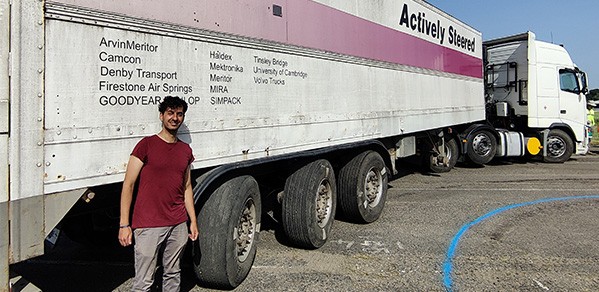
A new low-cost and lightweight steering technology, which began life in the Transport Research Group at the Department of Engineering, will be developed into a full-scale prototype on a Heavy Goods Vehicle (HGV) tractor-trailer, after being awarded a £30,000 grant by the Department for Transport (DfT).
In addition to significant improvements in manoeuvrability, the benefits of brake-actuated steering include unlocking the use of higher capacity vehicles in many urban and rural areas, improving efficiency, reducing emissions and operating costs.
Dr Francesco Amoruso
The project aims to develop and test an innovative brake-actuated steering technology to improve the manoeuvrability of a wide range of larger vehicles on the road, reducing carbon emissions and tyre wear.
The active rear-steering system, which sits within one of the DfT’s three key challenge areas – the ‘Future of Freight’– will be validated through controlled track testing for a variety of road surfaces, loads and number of steered axles. The project titled Brake-Actuated Steering to reduce the carbon emissions of HGVs has been funded under the DfT’s 2021 Transport Research and Innovation Grants programme.
The brake-actuated steering concept, developed by Research Associate Dr Francesco Amoruso during his PhD, controls the brakes on a trailer during cornering, allowing articulated vehicles to safely navigate in urban and rural areas. A single-axle proof-of-concept on an HGV trailer was built and successfully tested during Dr Amoruso’s PhD.
“In addition to significant improvements in manoeuvrability, the benefits of brake-actuated steering include unlocking the use of higher capacity vehicles in many urban and rural areas, improving efficiency, reducing emissions and operating costs,” said Dr Amoruso, co-principal investigator of the project. “The system eliminates tyre wear during cornering, enabling the use of fuel-efficient tyres.”
HGVs in the UK must prove their manoeuvrability performance by successfully completing the roundabout test. As a vehicle’s length increases, it becomes more productive and uses less energy per freight task. However, it is difficult for longer vehicles to pass the roundabout test and their lack of manoeuvrability poses a safety problem, particularly the increased tail swing (displacement of the vehicle’s rear edge compared to the front outer wheel). Large tail swings reach further than the front of the vehicle and can lead to collisions with parked vehicles, street furniture and block adjacent lanes.
Dr Daniel Ainalis, Senior Research Associate and principal investigator of the project, said: “As global urbanisation continues, it will become increasingly important to reduce the number of vehicles on our roads. Improving the energy consumption of each vehicle using longer vehicles is one of the only ways of achieving this. Vehicle manoeuvrability constraints are also important in rural areas, for example where the capacity of vehicles can be limited by narrow entrances to farms, requiring many more vehicle journeys (e.g. to collect milk). Another issue with reduced manoeuvrability of longer HGVs is the severe tyre scrubbing during cornering that rapidly wears the tyres and produces non-exhaust emissions. This is why the development and testing of our innovative low-cost and lightweight steering technology can help pave the way to more environmentally-friendly freight vehicles.”
Professor David Cebon, Director of the Centre for Sustainable Road Freight, added: “We are delighted to have received this grant from the DfT to continue our work with industrial partners improving the productivity and environmental performance of HGVs. Trailer steering is an enabling technology that can dramatically improve HGV performance in a wide variety of application areas.”

